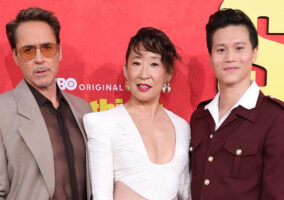
Okay, so that? THAT was the most entertaining hour of television we’ve enjoyed all year. Action, comedy, drama, heartbreak, and triumph – all in one episode! All brilliantly portrayed, with every member of the cast getting one quotable, character-defining moment, from “I’m in every moment we were together, all at once,” to “Wounds need air,” to “He talks too much.” “He surely fucking does,” to “It’s been a hoot!” And, because Damon Lindelof has learned his lesson from the trauma of being partially responsible for the Lost finale, practically every single question of the series was definitely answered!
But the explosively entertaining, emotionally devastating, question-answering, and all-around satisfying-as-hell finale of HBO’s Watchmen still left viewers with one tantalizing question to ponder. And no, it wasn’t “Is Angela a god now?” Nor is it the question that will likely launch a thousand fanfics: “Will she turn blue and take up the mantle laid down by her dead husband and become the next savior of the world as Sister Tulsa?”
Naah, it’s neither of those. First, because the importance of that egg has been foreshadowed several times over Angela’s story, going back to her introductory scene where her first action on camera was to crack an egg into a bowl. Second, because Jon made it extremely clear (or as clear as Jon is capable) what would happen if she ate that egg. He literally told her to “watch the eggs,” then took a walk on the swimming pool and told her it would be important later that she saw him do so. No, there was no question as to the outcome of her actions. She’s been glowing blue on the promotional image for the series since before it premiered. The question isn’t “What happens next?” It’s “Why on earth would she do that?”
Why would she resurrect a power that truly hasn’t done anything but bring more misery and stress into the world? Why would she give up her humanity after she begged Jon to retreat into his for a decade? Why would she want powers when the return of Jon’s powers caused death and destruction? Why would she want to become something that she just saw destroyed? Why would she put her children through almost certain emotional trauma after spending the entire series fiercely protecting them from it? Wasn’t the whole point of the finale voiced by Adrian when he said of Lady Trieu, “Anyone who seeks to attain the power of a god must be prevented at all costs from attaining it?” Is it a good thing or a bad thing if Angela walks on that water?
Okay, so those are a lot of questions, but they still all come down to one: Why, Angela?

Something HBO’s Watchmen alluded to much more strongly than Alan Moore’s original novel did is that Dr. Manhattan’s unique and infuriating personality isn’t so much a result of his powers and perceptions as it is of Jon Osterman’s experiences. Why else would the series give us a glimpse into his childhood just to show us that he had a lifelong sexual obsession that he needed to play out on a moon of Jupiter eighty years after the events that inspired it? Jon Osterman may have died a black man in love with a black woman, but the majority of his life and formative experiences were those of a repressed and privileged white man. From his time as a Jewish refugee during the war to his obsession with watchmaking, to his choice of career – and even of sexual partners – Dr. Manhattan lived his entire pre-Cal existence as a white man, making choices, enjoying opportunities, and repeating behaviors that arose directly out of his status and experience as a white man. The show’s writing is nuanced enough to understand and present the dual idea that a person can enjoy tremendous racial privilege while still being victimized by war, bigotry and persecution – two ideas that many white people have trouble reconciling. Hence, Will’s impromptu kitchen eulogy that Jon was a good man, but given what he had, he should’ve done a lot more. Hence Angela’s look of resignation in response, because after everything that’s happened, she knows her grandfather is right. Privilege is what kept Jon Osterman from seeing his Dr. Manhattan role as anything more than passive and reactive. Privilege is what allowed him to literally leave earth and all its problems behind for decades while he went off to build sand castles and sex dolls in outer space. Privilege allowed him to ignore the insanity of nuclear arsenals and the super-villainous rise of white supremacy without lifting a finger to do anything about them. Without even so much as acknowledging them. Privilege is also what inspired him to continually trade off romantic partners for younger replacements. His death was truly a romantic tragedy that brought tears to our eyes (due to the devastating performance of Regina King, mostly) but it’s no coincidence he addressed his first girlfriend Janey through his time haze while his second girlfriend Laurie and his wife Angela looked on helplessly; an extremely subtle reminder that, under it all, he’s always spent a good portion of his godhood as a dick-waving horndog. Angela’s initial comparison of him to Zeus was more on the nose than either of them realized.
Angela, on the other hand, has not only lived her life without the level of privilege that Jon Osterman enjoyed, but she has spent it trying to build something out of the nothing she was handed. Angela hasn’t spent her time trading up romantic partners or pondering the universe’s imponderables. She has worked to form a family around herself after being separated from her family of origin by a succession of traumatic events. She enacted a lifelong dream to become a cop, to protect people from the very trauma she has suffered. Most importantly she just completed a soul-shattering drug-induced walk through her family’s generational trauma, experiencing it all first-hand. Angela, to put it as bluntly as possible, has swung from the end of a rope. Watchmen makes no prediction about what kind of god she will eventually become (and showrunner Damon Lindelof has no plans to continue the story past that final, tantalizing shot), but it’s as clear as the water in that swimming pool that she’s not going to be anything like her predecessor.

This goes hand-in-hand with another subtle idea underlying the finale’s explosiveness: Lady Trieu wasn’t exactly a hundred percent wrong in what she was doing. Dr. Manhattan was both an extremely dangerous power to have walking around in a fog; easily detected by random trillionaires and racist senators, and also a disappointing, almost irresponsible manifestation of that power on behalf of its recipient. Given her clear narcissism (hilariously portrayed by the always-amazing Hong Chau), there’s no doubt Lady Trieu wouldn’t have remained a benevolent, nuclear-abolishing goddess for long, but it’s hard to call her a supervillain when she obliterates America’s most powerful racists with the flip of a switch. This type of moral grayness is at the heart of the original novel’s finale. The series simply shifted the focus away from nuclear armageddon and encroaching fascism and instead centered it on questions of race and power in American history. Which brings us right back to Angela and the egg. The entire refocusing of the series on these questions is so that the final question of the series can be definitively answered. Why would Angela do this? Because it has to be done and no one else can see that as well as she can. With great power comes great responsibility. It’s at the heart of every superhero story ever written. Watchmen upended nearly a century of heroic fiction born out of male power and white supremacy fantasies by handing the power of a god to a black woman and leaving us all to imagine the possibilities.
How fucking brilliant.
[Photo Credit: Mark Hill/HBO]
T Lo’s Weekend Pop Culture Reading List Next Post:
Timothée Chalamet, Saoirse Ronan, Florence Pugh, Greta Gerwig, and James Norton at the “Little Women” London Photocall
Please review our Community Guidelines before posting a comment. Thank you!



